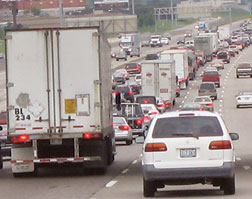Those looking for a clearer picture of the Supreme Court's views on environmental issues will have to wait for rulings on two key air pollution cases. Hints from the court's Nov. 29 oral argument on one Clean Air Act case indicated the justices remain split along conservative-liberal lines, with Associate Justice Anthony M. Kennedy the pivotal vote. A decision is expected by the end of the court's term next summer.
 HNTB Vehicle emissions questioned. |
The case, Massachusetts v. Environmental Protection Agency, centers on a 2003 EPA determination that the Clean Air Act did not give it authority to regulate vehicles' emissions of carbon dioxide and other greenhouse gases. Massachusetts disagrees. Last year, a federal appeals court ruled in EPA's favor, prompting the state to appeal to the Supreme Court.
During the first part of the oral arguments, the justices focused on the state's "standing" to bring the case, quizzing Massachusetts Assistant Attorney General James R. Milkey about how the state is harmed by global warming. Justice Antonin Scalia, a conservative, asked when the "expected cataclysm" would occur. Milkey replied that "it's not so much a cataclysm as ongoing harm." He added that the state stands to lose 200 miles of shoreline as water levels rise from global warming. "The harm is already occurring," Milkey said. "Our harm is imminent in the sense that lighting a fuse on a bomb is imminent harm."
When Deputy Solicitor General Gregory G. Garre, representing EPA, took his turn, he faced tough questioning and comments from liberals on the bench. Justice David Souter pressed Garre on what connection the state needs to show between cuts in greenhouse gas emissions and reduced land losses. Souter said that redressing injuries from greenhouse gases "is a question of more or less, not a question of either-or."
Ruling will decide if EPA has authority under the Clean Air Act to regulate vehicle emissions of greenhouse gases. |
Garre said that "we don't know what the rest of the world is going to do" if the U.S. restricts greenhouse gases. Justice Stephen Breyer said that if the U.S. decides to regulate carbon dioxide, it might lead to actions by other countries to combat global warming. Breyer suggested other governments might require carbon sequestration from powerplants and decide that increased ethanol use is a good idea. As a result of those steps, he said, "Lo and behold, Cape Cod is safe."
Ruling in 'New Source' Case Coming
Besides the Massachusetts case, the court also will be ruling on Environmental Defense v. Duke Power on which it heard arguments Nov. 1. That case deals with EPA's "new source" requirements, which kick in when modifications electric utilities make to existing powerplants result in increased pollution emissions.


Post a comment to this article
Report Abusive Comment